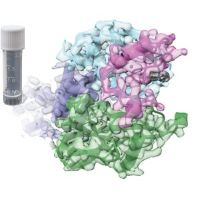Specification
| Description | Recombinant protein from the full-length sequence of Homo sapiens prokineticin 1 (PROK1) (NM_032414). |
| Organism | Homo sapiens (Human) |
| Expression Host | Human Cells |
| Tag Info | His or DYKDDDDK. Please contact us if you need further information or require specific designed tag. |
| Purity | Greater than 90% by SDS-PAGE gel |
| Uniprot ID | P58294 |
| Entry Name | PROK1_HUMAN |
| Gene Names | PROK1 UNQ600/PRO1186 |
| Alternative Gene Names | |
| Alternative Protein Names | Prokineticin-1 (Endocrine-gland-derived vascular endothelial growth factor) (EG-VEGF) (Mambakine) |
| Application | Antigens, Western, ELISA and other in vitro binding or in vivo functional assays, and protein-protein interaction studies; For research & development use only! |
| Buffer | Purified protein formulated in a sterile solution of PBS buffer, pH7.2, without any preservatives |
| Endotoxin | Endotoxin level is < 0.1 ng/µg of protein (<1EU /µg) |
| Length | 105 |
| Molecular Weight(Da) | 11715 |
| Protein Sequence | (The sequence of expressed protein may have some variation from the sequence shown below. Please contact us for the exact sequence.) MRGATRVSIMLLLVTVSDCAVITGACERDVQCGAGTCCAISLWLRGLRMCTPLGREGEECHPGSHKVPFFRKRKHHTCPCLPNLLCSRFPDGRYRCSMDLKNINF |
Background
| Function | FUNCTION: Potently contracts gastrointestinal (GI) smooth muscle. Induces proliferation, migration and fenestration (the formation of membrane discontinuities) in capillary endothelial cells derived from endocrine glands. Has little or no effect on a variety of other endothelial and non-endothelial cell types. Induces proliferation and differentiation, but not migration, of enteric neural crest cells. Directly influences neuroblastoma progression by promoting the proliferation and migration of neuroblastoma cells. Positively regulates PTGS2 expression and prostaglandin synthesis. May play a role in placentation. May play a role in normal and pathological testis angiogenesis. {ECO:0000269|PubMed:11259612, ECO:0000269|PubMed:11528470, ECO:0000269|PubMed:15292351, ECO:0000269|PubMed:17289879, ECO:0000269|PubMed:18339712}. |
| Pathway | |
| Protein Families | AVIT (prokineticin) family |
| Tissue Specificity | Localizes to glandular epithelium, stroma and vascular epithelial cells of first trimester decidua (at protein level). Up-regulated in first trimester decidua when compared with non-pregnant endometrium. Expressed in the steroidogenic glands, ovary, testis, adrenal and placenta. {ECO:0000269|PubMed:11528470, ECO:0000269|PubMed:15292351, ECO:0000269|PubMed:18339712}. |
QC Data
| Note | Please contact us for QC Data |
| Product Image (Reference Only) |  |

